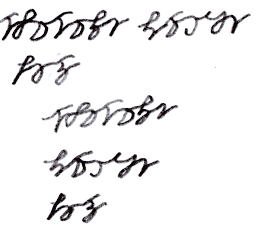















Oh, and for the curious, that phrase is from Azumanga Daioh, one of my favorite mangas. Naturally translated, it means "This could be really bad": もしかして [possibly] これ [this] 凄く [terribly] 悪い [is bad].
















I find my life is becoming increasingly surreal...No results found for user's guide.
Did you mean sea squirt?
Suggestions:
sea squirt
Esguard
Escouade
ice skate
ice-skate
upsurged
isosorbide
Arsacid
Esocidae
Szeged
escudo
Enschede
Assized
assuaged
exiguity
assessed
overskirt
The word you've entered isn't in the dictionary. Click on a spelling suggestion below or try again using the search box to the right.
Suggestions for user's guide:1. assurors
2. as regards
3. assorted
4. assessors
5. exorcised
6. exorcized
7. accessorized
8. ogresses
9. ozonized
10. isomerized
1500 years ago something extreme happened to the world's climate-something that must have terrified those who witnessed it.
The sun began to go dark.
Rain poured red, as if tinted by blood.
Clouds of dust enveloped the earth.
Cold gripped the land for two years.
Then came drought,
Famine,
Plague,
Death.
Whole cities were wiped out - civilisations crumbled.
There is evidence of a catastrophe-a catastrophe whose consequences affected the entire world-and may have changed the course of human history.
Incidentally, does 不関連名 [fukanrenmei - this is supposed to be a Chinese-style compound, meaning something like "no relation name"] sound okay, or does it sound like something that someone who knows only a little Japanese would write? :P
Well, we do not have a word 不関, but it sounds to me like "no relation".
and by 連名 you mean something like "joint names"?
不関連名 does not really make sense to me.
What are you trying to say?
Maybe I can translate into Japanese Kanji if you give me English expression.
That bad, huh? Well, what I was trying to say was "irrelevant name". That ended up being harder to translate than I expected, due to my rudimentary knowledge of Japanese. I was using 関連 [kanren] for "relevant" (although I also saw 関係 [kankei]), combined with 不 [fu] for "irrelevant" (though Google's translator prefers the prefix 無 [mu]), and 名 [na when used alone, mei when in a compound] for "name" (also saw 名前 [namae]). I wasn't really sure how the grammar for this would go. The one I sent you was just shoving it all together into a single compound word (I was thinking like 灼眼 [shakugan - "burning/eyes"] - from an anime name
- or 聖剣 [seiken - "holy/sword"] - from a game name) - fukenrenmei. Some other constructions I considered (and didn't know which, if any, would be correct):
- 不関連な名 or 不関連の名 ["fukanren na na" and "fukanren no na" - something like "name of no relation"] (I'm thinking な is correct in this instance, but I'm not sure [na is used for abstract modifiers, no for concrete])
- 関連がない名 [kanren ga nai na - something like "name for which there isn't a relation"] (clausal form)
Are any of those correct?
Now I see what you mean.
"relevant" means 関連 [kanren] or 関係 [kankei] like you said.
I think 無 [mu] is better for 関連 and 関係 than 不 [fu], as we have words 無関係 and 無関連.
名 [na] for "name" is also correct, and if you want to say "irrelevant name", 無関連な名 [mukanren na na] makes more sense to me than 無関連名 [mukanrenmei].
What you wrote was all correct.
関連がない名 [kanren ga nai na] means the same as 無(不)関連な名 [mukanren na na].
It is difficult even for me to combine something that means "irrelevant" and
something that means "name" without HIRAGANA.
無関連な名 [mukanren na na] is easier to understand than 無関連名 [mukanrenmai], but a word without HIRAGANA actually looks and sounds better.
Nom Gen Dat Acc Abl
Singular
Masc. hic huius huic hunc hoc
Fem. haec huius huic hanc hac
Neut. hoe huius huic hoc hoc
Plural
Masc. hi horum his hos his
Fem. hae harum his has his
Neut. haec horum his haec his
Near Far Further Int.
Noun kore sore are dore
Adj. kono sono ano dono
Example konna sonna anna donna
Manner koo soo aa doo
Place koko soko asoko doko

I'm sorry there's no elegant way to ask this: this is a legalBefore I'd formed my conclusion I was expecting a reply; however, that expectation ended abruptly when I proved that it was a bootleg through other means. Much to my surprise, I found this waiting for me when I got home from technical writing class:
(non-bootlegged) copy produced by JVC Victor (not Son May or some such),
right? The price just seems hard to believe, given that the retail price is
3045 yen.
Hi, sorry this is the sonmay version. ~JennyHoly crap, did I hear that right? I wonder if she knows she's selling bootlegged copies; I can't imagine she'd have responded if she did.






Blast Processing was a marketing term coined by Sega to advertise the fact that the Sega Mega Drive/Genesis could calculate faster motion than the Super Nintendo Entertainment System and was generally taken by the public to refer to the main system processors. Strictly the term refers to a technical feature of the Genesis that wasn't replicated on the SNES - the ability for the CPU to be working on one visible section of map while the graphics processor displays another. Since only the visible part of the map is uploaded at any one time, this feature greatly increases the distance that the map can scroll from one frame to the next, but few if any people will have been able to discern that meaning from the advertising.http://en.wikipedia.org/wiki/Blast_Processing
This is Q's public service announcement of the... well, since whenever the last one was. Today I'm writing to warn you about possibly the most idiotic, incompetent bank in the whole world: Wells Fargo. This bank is so special that it's been charging me a monthly service fee on my free savings account (which I only opened because I needed one to get their student credit card, at the time) for several years, now. I've been over there four times to yell at them and tell them to fix it. The first three times it was "I'm so sorry, sir, I'll fix it right now." Lo and behold: bam, monthly service charge on the next month's statement.
The fourth time, however, was a little different (note that it's exactly the same amount of money in the account as there was the last several years, minus their deductions). This time it's "You have less than the minimum balance in your account, sir. Didn't anybody tell you there was a minimum balance fee?" Uh, no. Okay, so I add another $1,400 to the account (several times the minimum balance). Four weeks later: bam, monthly service fee on the account statement.
Now, I'm not positive about what to make of the fact that the first three times I went there nobody mentioned a minimum balance. It could be that their bankers (the ones that have their own desks) are just absolutely clueless about how their bank policies work, and Gord knows what it was they "fixed" when they said they had done so; or, it could be that the minimum balance is a new policy (this is consistent with the fact that I have no recollection of any service charge, and I read all the account information before opening it, but I'm not absolutely positive that I haven't forgotten), in which case it wouldn't explain the first couple years of deductions.
In either case, go put your money into Nigerian banks, people; you'll get ass-raped less than with Wells Fargo. And do make sure to spread the word.
Yeah, I realize I still have some uncompleted series to finish (like the Japanese grammar series), but at the moment I'm feeling most inspired in something else, so bear with me.
From time to time the last couple months, I've been looking at English grammar (yes, as you might imagine, it was for some greater purpose; no, you can't know what it is). Today I've been going through the English verbs and classifying them according to how they are conjugated. English verbs are broadly divided into two groups: the regular verbs and the irregular verbs. However, I prefer a bit more specific classification than that, and have thus created my own classification system.
Regular verbs are verbs which follow a very specific conjugation pattern, illustrated below:
Infinitive: to _ (ex: to mark)
Non-past tense: _ (mark), _s (marks; third person singular)
Non-past participle/gerund: _ing (marking)
Past tense: _ed (marked)
Past participle: _ed (marked)
Notice that there are 4 distinct conjugations: the infinitive/non-past tense, non-past participle/gerund, non-past third person singular tense, and past tense/participle. But all 4 of these conjugations can be derived directly from the present tense (for regular verbs ending in a vowel, the final vowel is removed before appending suffixes). Most English verbs are of this class (at least by number of verbs; by frequency of use or number of commonly used verbs it's a totally different story).
I call this a 1' conjugation because it has a single root: either the present tense directly, or the present tense with the final vowel removed.
There's one more type of 1' verb, which, as process of elimination would dictate, is part of the irregular verb superclass. This is the Single Present/Past/Participle conjugation class. As the name implies, this class is distinct in that the present tense (non-third-person singular), past tense, and past participle conjugations are all identical. For example:
Infinitive: to _ (to cast)
Non-past tense: _ (cast), _s (casts; third-person singular)
Non-past participle/gerund: _ing (casting)
Past tense: _ (cast)
Past participle: _ (cast)
In this case, there are three distinct conjugations, all derived directly from a single conjugation - the present tense.
The full list of non-archaic verbs in this class: bet, bid, cast, cost, cut, hit, hurt, knit, let, put, read (this one only belongs in this class if you're talking about how it's written; it's pronunciation differs from the rest of this class), rid, set, shed, shred, shut, slit, spit, split, spread, and thrust (and writing this list has made me decide that I will not being doing any more all-inclusive lists). Note that a couple of those are verbs that are in the middle of a transition to regular verbs (for example, knit) - both the Single Present/Past/Participle conjugation and regular verb conjugation patterns are considered grammatically correct for them.
I probably haven't given you enough data to see this last point, yet, so I'll just say it. Save for a handful of highly irregular verbs (ones that do not fit any of the conjugation patterns I have discussed or will discuss in this series), there are only 5 possible distinct conjugations for a given verb, from which all other grammatical conjugations draw - the non-past tense, the non-past third-person singular tense, the non-past participle, the past tense, and the past participle. Save for the truly irregular verbs, all the other tenses and gender/number combinations are drawn from those 5 in highly regular ways (for example, all perfect tenses are formed by adding a helper verb to the past participle).
As well, in all but the highly irregular verbs, there are no more than 3 roots for any given verb (usually 1 or 2), which may be derived to form the additional distinct conjugations (for example, the third-person singular non-past conjugation is always formed by adding -s to the present tense; as well, the non-past participle is always formed by adding -ing to the non-past tense).
Oh, and for the trivia value, as far as I know, be/being/am/are/is/was/were/been is the most complicated and highly irregular word in the English language, having 8 distinct conjugations and 6 roots.